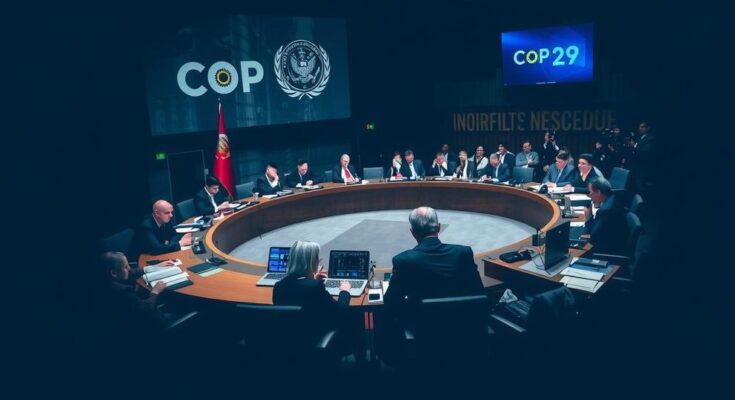At COP29, negotiators face challenges in finalizing climate finance agreements after mixed signals from the G20 summit. With just three days left, key issues such as funding sources and the need to transition from fossil fuels remain unresolved. Activists express skepticism over the G20’s commitment, emphasizing the urgency of substantial financial support for developing countries.
Negotiators at the COP29 climate talks in Baku, Azerbaijan, are striving to resolve ongoing disputes following the recent G20 summit, which acknowledged the need for substantial financial support for developing nations. With merely three days remaining at the conference, delegates are eager to capitalize on the G20’s calls for increased climate financing, although they express disappointment that the summit did not directly address crucial issues such as fossil fuel dependency and the complexities of funding sources. G20 leaders issued statements suggesting an escalation of climate finance from billions to trillions annually, emphasizing collaboration without providing explicit directions or funding commitments. Azerbaijani negotiator Yalchin Rafiyev commented positively on the G20 statement’s implications for climate discussions in Baku, while UN climate chief Simon Stiell urged nations to swiftly find common ground. Despite these optimistic signals, nuances in financial contributions remain contentious, with rich nations encouraged to augment their annual commitment of $100 billion to aid poorer countries. Discrepancies in expectations regarding specific funding mechanisms, particularly the preference for grants over loans, emerge as sticking points among developing nations. At the conference’s core, demands for an annual fund of $1.3 trillion are articulated by many developing countries, contrasting sharply with the estimated $7 trillion allocated for fossil fuel subsidies. Despite expectations for leadership from the G20, representatives from the Alliance of Small Island States and the G77+China group express skepticism about tangible outcomes. As discussions continue, the global commitment to collectively advance climate action remains paramount, with calls from EU representatives against regression on previous pledges. The COP29 negotiators aim to unveil a new draft agreement by the end of the week, highlighting the challenges of mobilizing effective climate finance amidst persistent geopolitical divides.
The Conference of the Parties (COP) to the United Nations Framework Convention on Climate Change (UNFCCC) serves as a crucial platform for global negotiations aimed at addressing climate change. COP29, currently set in Baku, Azerbaijan, has witnessed renewed discussions following the G20 summit in Rio de Janeiro, where leaders emphasized the urgency of providing climate finance to developing nations. The necessity for such funding arises in light of significant global economic disparities and the impacts of climate change, particularly on developing countries that have contributed minimally to global emissions. As negotiations progress, the balance between developed and developing countries’ expectations regarding financial commitments remains a focal point of contention.
In summary, the COP29 climate negotiations are at a critical juncture where discussions around climate finance are pivotal to achieving equitable outcomes for developed and developing nations. While the G20 summit has acknowledged the necessity for increased funding, many negotiators remain concerned that explicit commitments and actionable strategies are lacking, complicating efforts toward consensus. The future effectiveness of these negotiations will depend on the ability of nations to reconcile their positions and demonstrate a concerted resolve towards addressing climate finance collaboratively.
Original Source: www.france24.com




